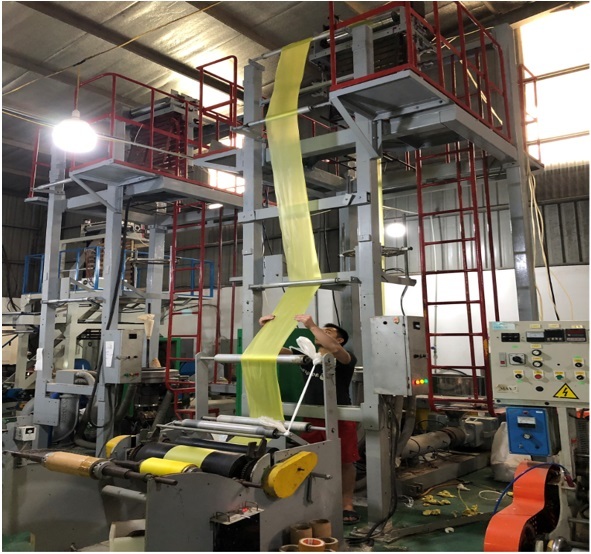There are many products in Vietnam made of plastics advertised as biodegradable products. But this actually is just the biological fracturing processes. The process is quite different from biodegradability. It is only aging, which leads to the disintegration of plastic vessels without complete decomposition.

Consequently, the process leaves and water plastic debris, contaminating the soil and water, especially preventing microorganisms from growing.
Nguyen Trung Duc and his co-workers from the Chemistry Institute belonging to the Vietnam Academy of Science and Technology carried out the research on a technology that makes real biodegradable garbage bags from waste plastics. The research work was conducted in 2017-2018 and has official acceptance.
Prior to that, the research team successfully synthesized oxidation promotion additives (including salts and metal compounds). This type of filler helps break down the original structure of the waste plastic, weakening the carbon bonds.
| To produce this type of bag, scientists carefully studied the properties of HDPE - a common plastic waste in Vietnam. When discharged directly into the environment, it will be extremely toxic. |
To produce this type of bag, scientists carefully studied the properties of HDPE - a common plastic waste in Vietnam. When discharged directly into the environment, it will be extremely toxic.
This plastic is processed and mixed well with the aforementioned additives. After that, technologies are used to form a bag. This bag will be able to self-decompose when it is discharged into the environment.
Compared to the plastic bags on the market, the team's biodegradable bags are more durable, with elasticity 5.06 percent higher. To test the decomposition, the team buried the bag sample in a soil garden in Phu Tho. After 12 months the bag decomposed by 70-100% in weight. It takes less than three years to disintegrate the bag, depending on its thickness.
According to Duc, the head of the team, the plastic bag won’t decompose into small pieces like other plastic bags, but will convert into water and CO2, which can easily absorb into the earth and bring nutrients to plants.
On May 28, 2018, the biodegradable bag received a certificate from MONRE as environmentally friendly plastic bag.
The team has filed a dossier to register a useful solution for the production of biodegradable plastic resins from waste plastic resins and biodegradable bags from biodegradable plastic resins.
The research team has cooperated with Lac Trung Technology and Trade Service to produce biodegradable bags from waste plastics with the capacity of 30 kilograms per hour. The bags, made with modern technology, can be used to hold rough, heavy items and items for daily use.
The research results have opened up the prospect of utilizing the waste plastic to produce useful products.
Linh Ha

Students turn discarded plastic bags into bricks
Tonnes of plastic waste, particularly discarded plastic bags threaten our planet with environmental pollution, and by now almost everybody knows it.

Ho Chi Minh City to remove plastic bags in supermarkets
All supermarkets in Ho Chi Minh City are expected to replace plastic bags by 2020 as part of a campaign to fight plastic waste launched by Prime Minister Nguyen Xuan Phuc.
 Within three years, the bag will decompose into water and CO2, easily penetrating the soil, bringing nutrients to plants.
Within three years, the bag will decompose into water and CO2, easily penetrating the soil, bringing nutrients to plants.